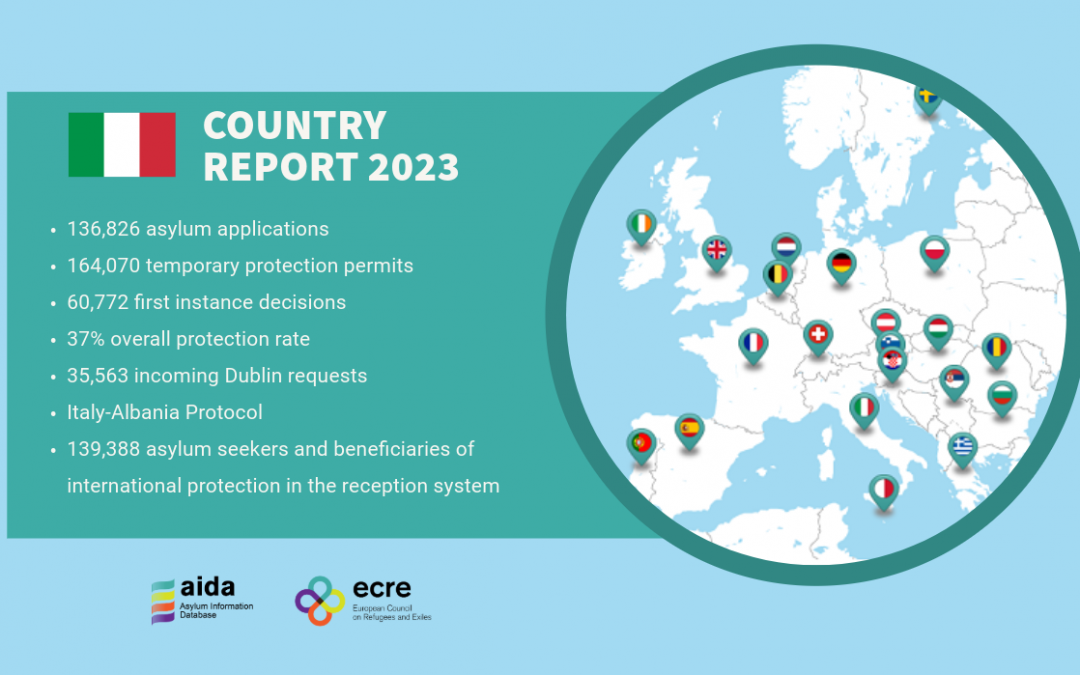The updated AIDA Country Report on Italy provides a detailed overview of legislative and practice-related developments in asylum procedures, reception conditions, detention of asylum seekers and content of international protection in 2023. It also includes an annex which provides an overview of temporary protection (TP).
In 2023, 136,826 asylum applications were registered in Italy (compared to 77,200 in 2022) and 164,070 TP permits were issued. Of 60,772 first instance asylum decisions, 8% of applicants were granted refugee status, 10% were granted subsidiary protection and 19% were granted a national form of protection (‘protezione speciale’). The overall recognition rate in 2023 was 37% (compared to 47% in 2022). 35,563 requests (including both ‘take charge’ and ‘take back’ requests) were received under the Dublin Regulation’s incoming procedure. At the same time, there were 6,530 requests under the outgoing procedure. The suspension of incoming transfers due to the state of emergency – currently prolonged until December 2024 – continued throughout 2023, during which time only 61 transfers took place of which 41 were based on family criteria.
Reports from civil society organisations confirmed that difficulties in accessing the asylum procedure – in particular for those reaching Italy by land – persisted in 2023. They also highlighted the frequency of illegitimate requirements that hindered the possibility of registering asylum applications (e.g. requests to communicate an official address or the possession of a passport. At Italy’s border with Slovenia, informal readmissions were drastically reduced but border controls under the Border Schengen Code were reintroduced. The Ministry of the Interior announced that these border controls had enabled police to prevent the irregular arrival of 1,600 people, to deny entry to almost 900 others and to make 76 arrests.
The ‘Protocol between the Government of the Republic of Italy and the Council of Ministers of the Republic of Albania on Strengthening Cooperation in Migration Matters’ was signed on 6 November 2023 in Rome and ratified through Law 14 on 21 February 2024. The official purpose of the agreement was to strengthen bilateral co-operation between Italy and Albania on the management of migratory flows from third countries through the construction of two centres on Albanian territory under Italian jurisdiction in which migrants who had been rescued in international waters and who should be channelled to border or return procedures would be hosted. The Protocol envisaged that the centres would have the capacity to accommodate up to 3,000 people at the same time. The centres are not yet active but their construction is reportedly almost complete.
At the end of 2023, 139,388 asylum seekers and beneficiaries of international protection were being accommodated in national reception centres. In May 2023, Law 50/2023 came into force. Combined with other legislative changes, this law removed the possibility of asylum seekers being able to access secondary level reception centres within the Accommodation and Integration System (SAI). Following the entry into force of Law 50/2023, access to the SAI would only be granted to asylum seekers who had been identified as vulnerable, and to those who had entered Italy through resettlement or humanitarian admission programmes. On 28 November 2023, the SAI was implementing 914 projects which provided 37,920 financed places (31,155 places for ordinary beneficiaries, 6,006 places for unaccompanied minors and 759 places for people living with mental health conditions or physical disabilities). The opening of an SAI project is entirely dependent on the will of the relevant local administration (mostly municipalities). As a result, there is uneven distribution across the country and projects are often concentrated in the South.
The full report is available here and the annex on temporary protection is available here.
For more information about the AIDA database or to read other AIDA reports, please visit the AIDA website.

